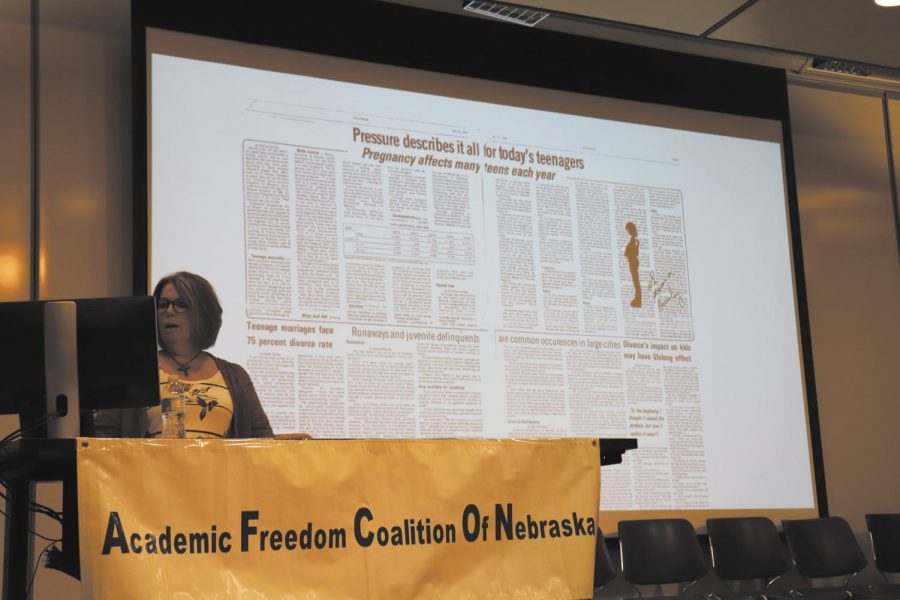Panel speaks on rights of student journalists | LB 206: bill to protect journalists
More stories from Emily Nelson
The Academic Freedom Coalition of Nebraska recently explored a key Supreme Court decision that controls student freedom of expression during its 32nd annual meeting at the University of Nebraska–Lincoln.
The Angels Theatre Co. re-enacted the events of the case, Hazelwood School District v. Kuhlmeier, with its show “A Tangled Issue: Student Freedom of Expression” at the AFCON meeting, held Oct. 12 at the UNL College of Journalism and Mass Communication.
Cathy Kuhlmeier Frey, who was the plaintiff in Hazelwood v. Kuhlmeier, was the meeting’s keynote speaker. Kuhlmeier recounted the case and the events leading up to it, including the court’s decision to rule in favor of the school district.
The Supreme Court found that the First Amendment does not prevent school officials from exercising reasonable authority over school-sponsored publications.
“Because of losing the case, it has caused students as well as advisors to feel threatened about expressing their First Amendment rights due to potential repercussions of writing their stories or allowing students to not be censored,” Kuhlmeier said.
Hazelwood changed the legal landscape for how the First Amendment was applied in public schools. The court held in Tinker v. Des Moines Independent Community School District that student expression should be protected unless it creates a substantial disruption. The 1988 Hazelwood standard superseded the 1969 Tinker standard, although some states later passed legislation to adopt the less restrictive Tinker standard.
The American Civil Liberties Union appointed attorney Leslie Edwards to represent the students. Kuhlmeier said Edwards was an amateur whom she believes was more interested in making a name for herself than handling the case properly.
“She did not bring up the facts that we just updated previously run articles,” Kuhlmeier said. “We had changed all of the names used and had written consent from all parties.Perhaps if she had, there would have been a different outcome.”
AFCON was established in 1988, the same year as the Hazelwood decision, to advocate for the protection of students against censorship in Nebraska schools and to support the arts.
Laurie Thomas Lee, president of AFCON, presented Nebraska state Senators Julie Slama and Adam Morfeld with the organization’s 2019 Academic Freedom Award.
Slama, a Republican, was recognized for her work on LB 399, which changed the name of the Americanism Committee, clarified provisions of the committee and gave duties to the State Department of Education regarding its curriculum. LB 399 was signed into law by Governor Pete Ricketts on March 27.
Morfeld, a Democrat, was recognized for his work on LB 206, which would provide a safeguard for student journalists against censorship, prior restraint and protection of media advisers’ jobs. LB 206 is currently on general file and will be debated during the next session.
Kuhlmeier joined Morfeld, two student journalists and a journalism adviser for a panel discussion following the keynote. Morfeld described the upcoming plans for LB 206 and what came with introducing the bill.
“This is one of the first issues where I have been on the other side of public school administrators,” Morfeld said. “They are a little uncomfortable opposing me on this, quite frankly, because we have a very close split in the Education Committee that could be very bad for public schools and education funding.”
Morfeld said that the biggest obstacle to expanding student journalists’ rights are school administrators. He said they have threatened to close down their schools’ journalism programs in the event that LB 206 is passed.
“You pretend that you are professional adults, but yet you are afraid that young people are going to have a voice on issues that are impacting them every day,” Morfeld said. “It makes no sense.”






![Discussion time. At an Ollin meeting on Dec. 4 (from left) sophomores Samuel Kucinsky, David Baker, Xavier Swotek, Ivan Gomez, and Joel Aguirre discuss the meaning of palabra, meaning “word” in Spanish. Ollin is the young men’s leadership group with the Latino Center of the Midlands. “While these initiatives are framed as leadership development programs, they extend far beyond that.They function as healing circles, offering a secure space for individuals to express themselves [and] share their experiences,” Ollin facilitator José Avalos said.](https://thechieftainspear.org/wp-content/uploads/2023/12/latinocenterofthemidlands-600x450.jpg)